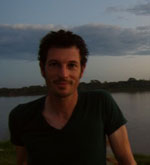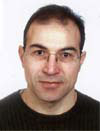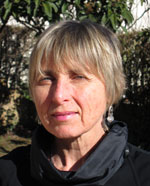 Thomas Servais
Thomas Servais
UMR 8217 Géosystèmes CNRS-Université de Lille1
Cité Scientifique
F-59655 Villeneuve d'Ascq
France
Thomas Servais is Research Director of the National Centre of Scientific Research (CNRS) at the University of Lille1 where he is currently leading the Géosystèmes research unit. He received his diplomas and doctoral degree at the Universities of Namur and Liège (Belgium). After post-doctoral positions in Liège, Berlin (Germany) and Keyworth-Nottingham (UK) he entered the French CNRS in 1997. His research is focused on Paleozoic phytoplankton, its biostratigraphy, paleogeography, paleoecology and biodiversity, with a special interest in the mechanisms of the Lower Paleozoic radiation. After having been president of the French paleontological association (APF) and vice-president of The Palaeontological Association (UK), he is currently President of the International Federation of Palynological Societies (IFPS) and a Vice-President of the International Paleontological Association (IPA).
 Pierre-Olivier Antoine
Pierre-Olivier Antoine
Institut des Sciences de l’Évolution de Montpellier
Université Montpellier 2, CC064
Place Eugène-Bataillon
F-34095 Montpellier cedex
France
Pierre-Olivier Antoine is a vertebrate paleontologist primarily devoted to Cenozoic mammal evolution, phylogeny, and spatiotemporal distribution. He completed his undergraduate training at the University of Toulouse and his PhD at the Muséum National d’Histoire Naturelle in Paris. He was Post-doctorate fellow at the University of Montpellier and Assistant Professor in the University of Toulouse.
His research combines phylogenetic analyses and fieldwork in remote areas such as Balochistan, Peruvian Amazonia, and the Andean Altiplano. Major focuses of his research are: i) Cenozoic stratigraphy, biochronology, and palaeogeography of Eurasia; ii) evolution of megaherbivores (anatomy, systematics, phylogeny, and biochronology), with respect to palaeoenvironmental changes and Cenozoic geodynamics; iii) Cenozoic Evolution of western Amazonian ecosystems and biodiversity, with respect to Andean geodynamics.
Outside interests include running (marathon) and drumming (in punk rock and hardcore bands).
 Taniel Danelian
Taniel Danelian
UMR 8217 Géosystèmes CNRS-Université de Lille1
Cité Scientifique
F-59655 Villeneuve d'Ascq
France
Taniel Danelian is Professor of Paleontology and Paleoenvironments at the University Lille 1.
He received his undergraduate training at the University of Athens and carried out his post-graduate studies (M.Sc., Ph.D.) at the University Pierre & Marie Curie (Paris 6). He was a research associate at the University of Lausanne, research fellow/lecturer at the University of Edinburgh and lecturer/senior lecturer at the University Pierre & Marie Curie (Paris 6). His main research focus is on plankton (especially Radiolarian) evolution and biodiversity dynamics, including its biotic response to global change. He is also interested in paleoceanography and the history of siliceous biomineralization in the marine biosphere. He is Past President of the French Paleontological Association and Editor-in-chief of Revue de Micopaléontologie.
 Bertrand Lefebvre
Bertrand Lefebvre
Laboratoire de Géologie de Lyon, Terre, Planètes, Environnement
UMR CNRS 5276, Université Lyon 1 & ENSL
bâtiment Géode, campus de la Doua
2, rue Raphaël Dubois
F-69622 Villeurbanne cedex
France
Bertrand Lefebvre is a permanent CNRS researcher in Palaeontology at Lyon 1 University. After receiving both his Diploma and PhD thesis at Lyon 1 University, he was appointed as short-term assistant professor in Palaeontology successively in Grenoble (Joseph Fourier University), Brest (Western Brittany University), before being recruited as a CNRS researcher in Dijon (Burgundy University). He is interested in the diversification of deuterostomes in Early Palaeozoic times ("Cambrian explosion" and "Great Ordovician Biodiversification Event"), with a special emphasis on echinoderms (taxonomic diversity, morphological disparity, phylogeny, palaeobiogeography, etc.). In the last ten years, his research activities focused on exceptionally preserved faunas from the Ordovician of Morocco.
 Brigitte Meyer-Berthaud
Brigitte Meyer-Berthaud
AMAP (Botanique et Bioinformatique
de l'Architecture des Plantes)
CIRAD, TA-A51/PS2
Boulevard de la Lironde
F-34398 Montpellier cedex 5
France
Brigitte Meyer-Berthaud is Directeur de Recherche CNRS in a mixed research unit dedicated to the study of plant architecture in Montpellier. She received her doctoral degree (thèse d’état) at the University of Montpellier. She won two-postdoctoral fellowships, one from the British Council at the University of London, the second from Ohio State University. Her current researches are devoted to the evolution of land plants during the terrestrialisation process in the Devonian. She is particularly interested in reconstructing the morphology and development pf the earliest trees. She does most of her field work in Morocco and Australia.

